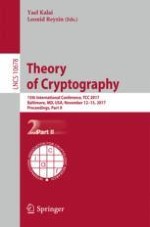2017 | OriginalPaper | Buchkapitel
Can PPAD Hardness be Based on Standard Cryptographic Assumptions?
verfasst von : Alon Rosen, Gil Segev, Ido Shahaf
Erschienen in: Theory of Cryptography
Aktivieren Sie unsere intelligente Suche, um passende Fachinhalte oder Patente zu finden.
Wählen Sie Textabschnitte aus um mit Künstlicher Intelligenz passenden Patente zu finden. powered by
Markieren Sie Textabschnitte, um KI-gestützt weitere passende Inhalte zu finden. powered by
Abstract
-
Average-case PPAD hardness (and even SVL hardness) does not imply any form of cryptographic hardness (not even one-way functions). Moreover, even when assuming the existence of one-way functions, average-case PPAD hardness (and, again, even SVL hardness) does not imply any public-key primitive. Thus, strong cryptographic assumptions (such as obfuscation-related ones) are not essential for average-case PPAD hardness.
-
Average-case SVL hardness cannot be based either on standard cryptographic assumptions or on average-case PPAD hardness. In particular, average-case SVL hardness is not essential for average-case PPAD hardness.
-
Any attempt for basing the average-case hardness of the PPAD-complete problem source-or-sink on standard cryptographic assumptions must result in instances with a nearly-exponential number of solutions. This stands in striking contrast to the obfuscation-based approach, which results in instances having a unique solution.
